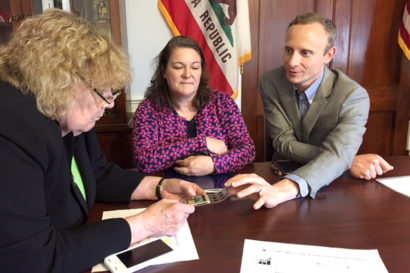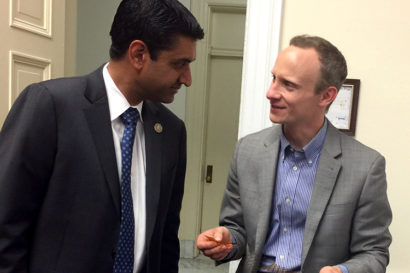For Berkeley entrepreneurs, success means leaving the classroom
The regional I-Corps program, a collaboration among UC Berkeley, UCSF and Stanford, teaches entrepreneurs from STEM disciplines to take a hard look at their ideas and turn them into products with high market potential
July 11, 2017
Eric Munsing, a civil and environmental engineering Ph.D. student at UC Berkeley, is part of a nascent startup that’s working to figure out how to charge fleets of electric cars — and to come up with a marketable product.

Eric Munsing (right) and Rhonda Shrader (center) meet with Rep. Zoe Lofgren in May to discuss the success of the regional I-Corps program.
Car manufacturers would be their main customers, they thought. But then, as part of the Bay Area I-Corps program, they had to interview 20 potential buyers. And they found out something that made them rethink their approach: Their real customers, it turned out, were the people and agencies that managed fleets of cars.
Rhonda Shrader, executive director of both the Bay Area I-Corps and of the Berkeley Haas Entrepreneurship Program, says the key to creating a successful product is to get out of the office and talk to potential buyers. “It’s about really, honestly asking for customer feedback, assessing it and then using that to find what we call product-market fit,” she says.
The regional I-Corps program, a collaboration among UC Berkeley, UCSF and Stanford, holds trainings once a month at Berkeley’s Haas School of Business or College of Engineering. Funded by the National Science Foundation, it teaches committed entrepreneurs from STEM disciplines to take a hard look at their ideas and turn them into real, sought-after products in the market. It’s something that takes determination and flexibility, says Shrader, and the potential for a much bigger payoff.
“The first idea you start out with — it’s very different than the idea that ends up hitting product-market fit,” says Shrader.
Munsing, who recently completed the I-Corps program at Haas, and his team — led by Berkeley Ph.D. graduate Caroline Le Floch — started eCalCharge last year to work on challenges that electric cars will be posing to the energy infrastructure as their use grows in the next decade.
In just one week, the I-Corps training program had them thinking in new ways.
“This is the big difference between academics — where you’re always thinking out years into the future — and entrepreneurship — where you have to be able to find a customer who is going to start paying for it tomorrow,” says Munsing.
The eCalCharge team went on to participate in the national, eight-week NSF I-Corps program, which provided $50,000 to the team to help them conduct 120 more interviews with potential buyers — electric utilities, people who service electric cars, dealers who sell them — to try to understand what matters to them, and the challenges they face as the state moves toward its goal of getting 50 percent of its energy from clean, renewable sources by 2030.
By the end of the national program, the team found that one of the biggest barriers for fleet managers — such as Alameda County, which has a fleet of hundreds of cars, 50 of which are electric — wasn’t the cost of vehicles, but the high cost of installing electric charging stations, which can run the same price as the car itself.
So, the team readjusted their strategy once again. “Without this program, we would definitely still be stumbling around… developing software that nobody would actually buy,” Munsing said.
The NSF Bay Area Regional I-Corps Node has had a role in creating 300 new jobs from participating startups, says director Shrader, and those teams have raised $30 million in venture capital and another $10 million in grants.
In May, Munsing and Shrader met with members of Congress, including California representatives Barbara Lee, Zoe Lofgren, Ro Khanna and Mark Takano, where they detailed the accomplishments of the 5-year-old program. The meetings were part of the Coalition for National Science Funding Advocacy Day in Washington, D.C., to provide updates on return-on investments of NSF funding.
The I-Corps regional training is free and open to all Bay Area entrepreneurs, from Berkeley undergraduates with a solid startup idea to established experts in their fields who want to create a marketable product.
Learn more at https://bayicorps.com/.

